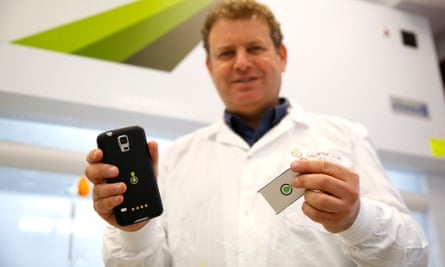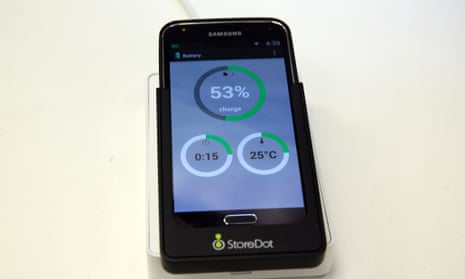More than a better camera, a slimmer handset or a larger screen, smartphone users know what they want most from their device, according to a recent survey: longer battery life.
Doron Myersdorf’s solution takes only a minute. His Israeli company, StoreDot, has developed a battery that can be charged in 60 seconds which he says can end dead-phone dread because no handset will be lifeless for long.
“The whole anxiety of your phone [going] dead goes away because if [recharging] happens in one minute, there is not an issue,” Myersdorf says.
Although the StoreDot battery does not last as long as conventional phone batteries, its makers argue that the short charging time more than compensates.
Myersdorf adds that handsets will become more innovative as a consequence.
“Once you have an unlimited battery – because this is what we are offering … your whole applications and your whole usage model of the phone changes so you have better devices which are more energy-hungry, you have more applications which do amazing things.”The StoreDot battery system emerged from the nanotechnology department of Tel Aviv University, a by-product of research being carried out into Alzheimer’s disease.
Researchers found interesting properties in a certain peptide molecule – a chain of amino acids – that affects neurons in the brain and causes Alzheimer’s. It turned out that these molecules had high capacitance, the ability to hold an electrical charge.
When two of these molecules are combined, they make a crystal which is two nanometers in size – two billionths of a metre. These “nanodots” form the basis of the StoreDot technology. Because of their increased capacitance, they can make batteries which rapidly absorb and hold a charge.
That has led to a three-tier system from StoreDot for charging a mobile phone: the battery within the phone; a special charger which can pump a strong electrical current into the phone; and the system within the phone which manages power use efficiently .
“The charger itself is not a normal charger. We need to pump 40/50 and up to 80 amps of current into this battery in order to charge in one minute. No normal charger can do that. So we had to develop a very strong charger that is, first of all, cost effective but also small enough to be carried in your pocket,” Myersdorf said.
Early examples of the battery, which weighs the same as current smartphone batteries, show a graphic dial on a phone lighting up as the seconds go past before finally reaching full capacity.
As the electronics industry is heavily focused on battery charge length – in everything from tablets to the new generation of wearable tech such as the imminent iWatch – the advent of any new form of battery attracts major interest.
Any debate about the features of a particular smartphone turns inevitably to the longevity of the battery.
As phones have expanded from the basic task of making calls and sending texts to filming and screening video clips, the demands on batteries have increased.
Users have been advised to turn the screen brightness down, switch to airplane mode and turn off Wi-Fi to save the battery during the day, as well as shutting down apps running in the background

However, the new battery itself will not have a prolonged lifespan. The current generation of StoreDot batteries will last about one-third less of the time than those in standard smartphones at the moment.
This means that heavy users with a StoreDot battery will probably recharge their phone about once during the day. However, Myersdorf says their research shows that 60% of heavy mobile phone users leave the house with a charger at present anyway.
By 2018, StoreDot says that its battery will also outlast current smartphone batteries, which typically last a day, depending on how heavily they are used.
If a manufacturer adopts StoreDot technology, it will add just over £30 to the bill for a handset. Talks are taking place with 15 smartphone manufacturers with StoreDot wanting to sign launch agreements with “one or two” by the end of this year.
It hopes to have a phone with the battery system in the hands of consumers by Christmas 2016. The system cannot be retrofitted to an existing phone.
“The problem is that there needs to be a sequence of developments which needs to take place in parallel to what StoreDot has done and these are a specially designed smartphone, a specially designed charger which is based on our charger, and a certification of the battery in terms of safety,” says Myersdorf.
“From our analysis we believe that 30% of the people will pay a little bit more – roughly $50 (£32) more – on the phone model if it charges faster.
“If one of the big guys [phone manufacturers] feels that this is a game-changer like we do, they put it on their roadmap. They can make it happen. StoreDot alone cannot make it happen.”
The main problem for users adapting to the new system would be to get people used to the idea of charging once during the day, he says. So far, the company has received $48m in funding from a number of investors including Samsung and Chelsea Football Club owner Roman Abramovich.
The same technology can be used, according to StoreDot, to power up electric vehicles within five minutes.
A further investment would allow StoreDot to show they can power a car which would then be able to drive for 150 miles on that five-minute charge, says Myersdorf. Again, compared with rival products the StoreDot car battery would be more expensive although the price will inevitably come down as its popularity increases, he says.
The technology can also be used to power brighter computer and smartphone screens.
StoreDot aims to penetrate 2% of the smartphone market in the first year after launch and 6% in the second, says Myersdorf. It is a market where well in excess of 1 billion units are sold each and every year, so a solution to dead phone anxiety could prove lucrative.

Comments (…)
Sign in or create your Guardian account to join the discussion